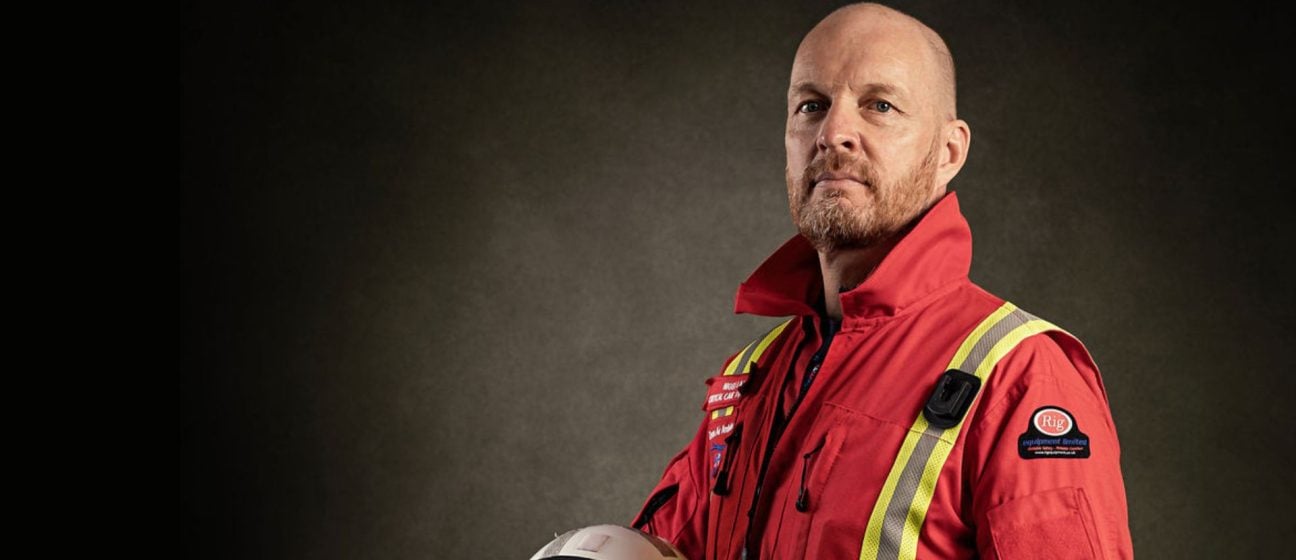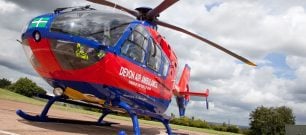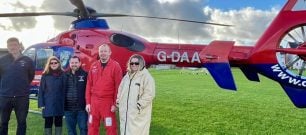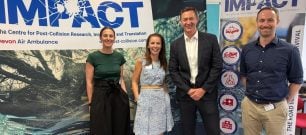
Nigel is an Advanced Paramedic in Critical Care and Research Lead. He transferred from working on land ambulances to Devon Air Ambulance. He shares how he adapted to the demands of the Helicopter Emergency Medical Service.
Who is Nigel?
Nigel is an Advanced Paramedic in Critical Care and Research Lead. He transferred from working on land ambulances to Devon Air Ambulance. He shares how he adapted to the demands of the Helicopter Emergency Medical Service (HEMS) and what helps him to maintain his professional responsibility to patients in the face of sometimes harrowing experiences.
Nigel's story
‘Early in my healthcare career I trained as an Emergency Medical Technician before qualifying and gaining paramedic registration. After many years working on road ambulances, I was encouraged by a HEMS paramedic friend, to take on that challenge myself. I was drawn to the clinical and operational complexities of responding to patients by helicopter, so I applied to Devon Air Ambulance where I’ve now been since 2009.
I’m sometimes asked about how I dealt with the transition to more trauma-related incidents, and clearly my experience on the land ambulance helped to prepare me. It doesn’t get easier seeing very poorly patients, but familiarity and experience helps.
‘I feel there is a professional responsibility to cope. Working as a team is fundamental and no-one works on their own. We listen to each other, and we share our thoughts and our feelings. Any of us could be affected by a particular incident at some point – perhaps because of something that resonates with us personally. Different scenarios affect people differently.
‘The incidents that challenge me emotionally are those that might have been avoided. This is particularly common when we attend road traffic incidents, where a decision by the driver, pedestrian, cyclist or motorcyclist might have changed the situation entirely.
Collaboration at our core
‘Where possible, after an incident, we bring all agencies together for a debrief, and depending on the nature, might include the Police, Fire & Rescue, Coastguard, RNLI, Search & Rescue and Ambulance crews. It’s called a ‘Hot Debrief’ and begins with the recall of the first person on scene, explaining what they saw and their immediate actions, this is then followed by the next person on scene and so on, building a picture of the whole incident as it unfolded. This not only gives the opportunity to ask questions but also allows us to share and develop best practice, it’s educational too as no incident is identical and we learn from each one.
I am interested in what motivates road users to make a decision that results in a collision: What made them take that bend at that speed? Why make that impulsive decision at that junction?
‘Prevention is important to us, and we work with other agencies with the aim of reducing road traffic collisions. The research aspect of our work at Devon Air Ambulance is so important, and one of the key areas of focus is on improving the response and treatment of road traffic casualties.
‘I am the Research Lead here at Devon Air Ambulance, we collaborate on national and international studies and have published papers on a number of subjects.
‘We are a key stakeholder in the National HEMS Research and Audit Forum, this is an industry wide collaboration involving all UK HEMS services, with the aim of learning together and sharing results that lead to procedural change.’
Achieving balance
‘At Devon Air Ambulance, we try to improve someone’s worst day as much as we can’.
‘This ambition applies to the patients’ family too. They can be deeply affected by what’s happening to their loved one.
‘Many of us find ways to balance the emotional challenges of the work we do and the impact of that work. For me, when I’m not on shift, I get outdoors and embrace nature. I love to kayak and rock climb. This is where I gather my thoughts and enjoy the solitude. It’s important to achieve a balance so we can show up for ourselves as well as for our patients.’
As a charity that is not part of the NHS and is clinically independent, Devon Air Ambulance is free to train clinicians that enables us to undertake advanced procedures and treatments not available to other front-line services.
This means the crew can be called to time-critical incidents across the county – fast – bringing critical care straight to the side of a patient.
We also undertake our own research as part of our prevention strategic aims, in which Nigel plays an important role.
Our crew responds thanks to your continued support.



